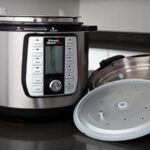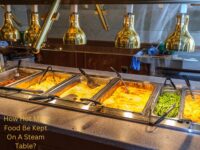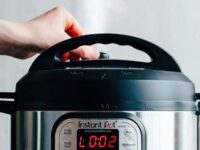A pressure cooker is an appliance used for cooking food by trapping steam inside the pot, which raises the internal pressure and temperature, cooking food faster than traditional cooking methods. One of the concerns of people who are considering buying a pressure cooker is whether it uses a lot of electricity or not. In this article, we will explore this topic in detail Does Pressure Cooker Use A Lot Of Electricity and look at the advantages and disadvantages of using a pressure cooker?
Does Pressure Cooker Use a Lot of Electricity?
The power consumption of a pressure cooker varies depending on the model, size, and cooking time. However, on average, a pressure cooker uses between 1000-1300 watts of electricity. This may seem like a lot, but compared to other appliances like an oven or stove, a pressure cooker consumes less electricity. Additionally, a pressure cooker’s cooking time is much shorter than traditional cooking methods, which means it uses less electricity overall.
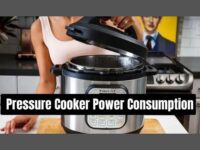
Is a Pressure Cooker Cheaper to Run Than an Oven?
A pressure cooker is cheaper to run than an oven. An oven’s average power consumption is around 2000-5000 watts, and it takes much longer to cook food in an oven than in a pressure cooker. Therefore, a pressure cooker is more energy-efficient and cheaper to run.
What are the Disadvantages of Pressure Cooking?
While pressure cooking has several advantages, it also has some disadvantages. One of the main drawbacks of using a pressure cooker is that it requires constant monitoring to ensure the pressure is maintained and there are no accidents. Additionally, some types of food may not be suitable for pressure cooking, such as delicate seafood or eggs. Lastly, a pressure cooker requires a longer cooling time than other appliances, which may not be convenient for some users.
Is it Cheaper to Use a Pressure Cooker or a Slow Cooker?
Both pressure cookers and slow cookers are energy-efficient and cheaper to run than traditional cooking methods. However, the cooking time for both appliances differs significantly. A pressure cooker cooks food in a fraction of the time it takes a slow cooker, which means it uses less electricity overall. Therefore, a pressure cooker is cheaper to use than a slow cooker.
Does Using a Pressure Cooker Save Money?
Using a pressure cooker can save money in several ways. Firstly, it uses less electricity than other appliances like an oven or stove. Secondly, a pressure cooker’s fast cooking time means it consumes less energy and saves time. Lastly, it can save money on groceries as it allows cheaper cuts of meat to be cooked to tender perfection.
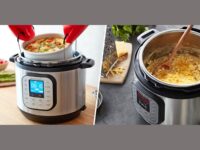
What are 2 Advantages of Cooking in a Pressure Cooker?
One of the main advantages of cooking in a pressure cooker is that it cooks food faster than traditional cooking methods. Secondly, it retains more nutrients and vitamins in the food, as it cooks at a higher temperature and pressure than other appliances.
Is a Pressure Cooker Hard on Electricity?
A pressure cooker is not hard on electricity. While it does consume electricity when in use, it is energy-efficient and uses less electricity than other appliances like an oven or stove. Additionally, a pressure cooker’s cooking time is much shorter than traditional cooking methods, which means it uses less electricity overall.
Do Instant Pots Use a Lot of Electricity?
Instant Pots are a type of electric pressure cooker and have similar power consumption to traditional stovetop pressure cookers. They use between 1000-1300 watts of electricity, which is relatively low compared to other appliances.
Do Electric Pressure Cookers Use Less Electricity?
Electric pressure cookers use the same amount of electricity as stovetop pressure cookers. However, they may be more convenient to use and may save time, as they don’t require constant monitoring like stovetop pressure cookers.
Conclusion:
In conclusion, a pressure cooker is an energy-efficient appliance that uses less electricity than other appliances like ovens or stoves. It is cheaper to run than an oven and can save money on groceries, as it allows cheaper cuts of meat to be cooked to tender perfection. Pressure cooking also retains more nutrients and vitamins in the food and is a faster cooking method, which makes it a popular choice for busy households. While pressure cooking has some disadvantages, like constant monitoring and longer cooling time, its advantages outweigh the disadvantages for most people. Whether using a stovetop or electric pressure cooker, the power consumption is relatively low, making it a convenient and cost-effective cooking method for most households.



